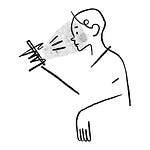This upcoming fall, in the year of our Lord 2020, feels like a path covered by fog, with only the first few steps visible. But here's the thing: that's the way life always is, pandemic or not. Here's what to do about it.
Order Tsh's new book, Shadow & Light
Get Tsh’s weekly email, 5 Quick Things
Browse Tsh’s recommended books
Sign up for Tsh’s audio workshop, Create Your Rule of Life (pay what you want — really!)
This is The Good List — I’m Tsh Oxenreider.
This is a habit.
I don’t know about you, but when I think of this upcoming fall, in the year of our Lord 2020, it feels like looking at a path covered mostly by fog, with only the first few steps in front of me visible. This global pandemic has made it such so that for many of us, our life still isn’t “normal.” If you’re in the U.S., which is where we’re now woefully behind much of the world in terms of collectively lowering our case numbers, many things are still either closed or not operating as normal: stores and restaurants allow only minimal capacity, libraries are grab-and-go only, many churches are still online-only (as well as other types of gatherings), and of course, you gotta wear your mask everywhere.
The understatement of the year is that things are different. And so it’s natural to see mostly fog when we think of the rest of the year because for many parts of our life, we don’t know how next week will operate, not to mention the rest of the year.
But here’s the thing, and you know it’s true if you’re listening to this some other time of year, or years into the future: we’ve never been able to see very far along our paths. The most we’re ever given, at any time, is a few steps of visibility, with the bulk of the future in front of us covered in fog. So, pandemic or not — the reality of not knowing what’s in store for us is just how the world works. A pandemic might make it feel more relevant, or pressing, because our usuals are all upended, but nothing’s changed about what we can control, if you think about it: because there’s actually only a few things we can control at any time in our life, global crisis or not. And that’s not to be fatalistic — in fact, this is encouraging.
It’s encouraging because when we’re uncertain about most parts of our lives, we can only focus on the things that we’ve been given to control and oversee. At some point, we have to let go of the stuff that’s not ours to control (beyond the part we can play ourselves): so, for example, we do our part to socially distance, wear masks, wash our hands, and self-quarantine when we show symptoms of being unhealthy, and the like, but the global pandemic numbers are out of our personal control. We pray, we encourage other people, and we set an example, but it’s not up to us to make all the numbers in the world go down (unless, of course, you’re an epidemiologist tasked with eradicating the virus, in which case, yes please, go forth and do this noble work, and godspeed).
This is the same for our “regular” lives. We do our part, for example, to do the tasks on our list for work, be good employees, and do our jobs with excellence, but ultimately we’re not in control of how our bosses react, or how other coworkers do their jobs. We do our part to be a good parent, but we’re not in control of our child’s reactions — as I read somewhere recently, my child may not be impressed with my parenting, but right now I’m not impressed with my child’s childing.
My point is that when it feels like the future beyond just a few steps is covered in fog, that’s because it always is, and that’s okay, because that’s how life works. And yet, we can do so much more than despair, because we still life on our plates the responsibility and privilege of doing that which is ours to do.
So in the case of this fall, specifically 2020, there’s obviously a lot of unknowns, but copy and paste these thoughts for all of life, right? In fact, no matter when you’re listening to this, consider this a pep talk at any time. In the next two episodes here on The Good List, I’m going to expound on the idea of embracing your fog-covered reality with more practicals, but for this first part, I think it’s good for all of us to remember these things:
Life is filled with partial solutions.
It’s wise to create routines & rhythms where we can. And
Focus on that which is only on us to control.
If you know me at all, or if you’ve read or listened to me for a while, you know I’m all about partial solutions. So I won’t rehash what I’ve already said in detail, but here’s the gist: because life doesn’t work perfectly, as mature adults we need to embrace partial solutions. I first learned this when we lived overseas, and I was telling my therapist that it wasn’t worth the effort to meet with a girlfriend over coffee to make deeper friendships because in our city it’d take an hour of public transportation one-way to meet with an English-speaking friend over coffee for an hour, then an hour back on public transport home. I had a two-year-old, was pregnant with my second, was in the deep mire of depression, and I was in culture shock. No way was a cup of coffee with someone who was only an acquaintance worth it.
He stopped me in my tracks when my therapist said, “Actually, it is worth it. Nope, it’s not ideal, because ideal would be a coffee shop a five-minute walk away to meet a friend you’ve known for years and the language barrier isn’t a problem. But that’s not your reality. So with your reality in mind, the traveling two hours for one hour of coffee with an acquaintance is a partial solution. It’s what’s good enough; it’s what will work for now. And it’s worth the effort, because it’s what you got.”
This wisdom is what kept me living overseas for several more years after that, and honestly, it’s what’s gotten me through many, many other situations in my life since then, and on this side of things, I now say that it’s a sign of maturity to embrace partial solutions. Life doesn’t bend to our will. So, how will I make my current situation, as-is, work for right now, even if it’s not my ideal? That’s embracing partial solutions. And right now, this particular rest of the year 2020, but really at any time, we’ve got to embrace our partial solutions. Very little in life these days is ideal, but that’s okay, because most of us have enough partial solutions to things that will work.
Second, it’s wise to create routines and rhythms where we can. If I’m not able to control things like how work meetings run on Zoom, or how much longer the mail takes to arrive these days, or the options for my kids’ schooling, I can create small little rhythms to my day to help me feel more grounded. My friend Kendra talked recently talked about her morning routine in episode 38 of The Good List, and I talked about mine back in episode 3. Morning routines are a great example of this, because these little rituals are what help us feel grounded when lots of life feels uncertain. Waking up at roughly the same time, then doing my familiar routine of making coffee, reading and prayer, writing out my day’s to-do list, working out, and showering help keep us grounded. I won’t go into more for now, but in an upcoming episode, I’ll talk a bit more about the goodness of life-giving routines right now.
And third, like I’ve already said, it’s essential to focus our efforts on that which is only on us to control. I’ll also get into this more in an upcoming episode, but in essence, it’s good to remember that even during a global pandemic, and even when things feel foggier in front of us for whatever reason, relationships are still the most important thing — they trump to-do lists, feeling productive, having a perfectly cleaned house, increasing our wealth, or being in shape. The people we’ve been given to love and serve are the things that matter most, including our families, our neighbors, and the collective common good. So when we make an effort to control that which is ours to control — namely, our reactions to circumstances — we are investing in our relationships because we’re investing in our character, in ourselves, in our humanity. Again, more on this in an upcoming episode.
As this episode goes out, in late summer 2020, yes, there’s not much that’s predictable in front of us, but there are a few solid things on our calendars: and that’s holidays. And if you're like me, even though I usually balk at the thought of longing for a holiday season months before it’s time, this year I kinda get it. I’m craving fall right now: the weather, of course, because here in Texas it’s basically the surface of the sun, but honestly, how good does it sound right now (if you’re in the northern hemisphere) to watch leaves change color, curl up with a blanket, bake with pumpkin, and generally feel like time is moving? I’m raising my hand here, which is why I especially feel like the eventual holidays are a welcome sight for sore eyes: they’re way in the distance, but it sounds nice to have them waiting for us. It’s a sign of hope, because we know they will happen.
This ties in to some news I have, which is actually hilarious considering it’s late summer: my next book comes out in only 10 days if you’re listening to this episode when it comes out. 10 days! And the reason it’s mildly hilarious is because this next book is for Advent. Yep, the four weeks we recognize that lead us to the season of Christmas. It’s called Shadow & Light: A Journey Into Advent, and it’s officially out in bookstores everywhere on September 1.
It’s certifiably bonkers to talk about Advent right now, seeing as most of us are just trying to get our heads around a new school year beginning where absolutely nothing is normal — so I’m not going to talk to you about Advent. I’m not a monster. All I’m going to do right now is tell you this:
When you go ahead and order your copy of Shadow & Light now, what you’ll do for Advent is already crossed off the list. I wrote this guidebook for Advent using the Psalms because I couldn't find what I needed: something entirely open-and-go, that would work for our whole family, with a no-pressure, you’re-never-behind quick reflection that’s still meaningful and meaty.
Advent isn’t until November 29 in 2020, so there’s no urgency to planning right now — but by ordering your copy of Shadow & Light now, you won’t have to remember later, when it’s two days before Advent (which we’ve all been there). And, as a thank you for ordering early in the season, I’m giving you two extras, to help you prepare for the holidays with a stress-free mindset:
A 3-part audio series, where I share a 101 on just what is the liturgical calendar (and Advent), how to incorporate more of the rhythms of the liturgical calendar in your everyday life, and a conversation with my friend Haley Stewart, where we chat about what we do in our own homes with our kids’ ages for Advent.
And two, a gorgeous liturgical calendar wheel from artist Leah Banick that you can print and hang as reference and as art.
These are gifts intentionally to not clutter your life, they’re to pair with Shadow & Light so that you get more out of Advent without doing more or adding more to your plates. And also, ordering books early really helps your favorite authors, because with your order, you’re telling bookstores that this book has readers, so they’ll make sure they have plenty stocked up. And this is actually important for a book like Shadow & Light, because it’s seasonal — and with this being an election year, Advent will sneak up on people, and I’d hate for bookstores to not have enough copies of Shadow & Light in stock later in the fall. So, if you can, and you like the thought of both supporting this book and making your life easier by giving your future self the gift of already having your Advent guide, please go ahead and order Shadow & Light now. And thank you so, so, so much already — I can’t do what I do without readers, which is you, so you’re truly a gift to me.
To find the book, and the free extras I want to give you, go to shadowandlightadvent.com, or use the link I’ve got in the show notes of this episode, #40 of The Good List. One more time, that’s shadowandlightadvent.com. As a reminder, I’m on twitter @tsh and every now and then on IG @tshoxenreider, but if you’d really like to interact with me and stay in the know with what’s on my mind, your best bet is my free weekly email called 5 Quick Things. This is where I devote most of my energy to communicating with you, and I send it out most every Friday morning. So to get it, go to fivequickthings.email, and sign up for free, or find the link in this episode’s show notes.
Music for the show is by Kevin MacLeod, and thanks, as always, to Caroline TeSelle and Kyle Oxenreider for their help, as well as my furry intern, Ginny. I’m Tsh Oxenreider, and I’ll be back with you soon — thanks for listening to The Good List.










Embrace Your Foggy Unknown (1/3)